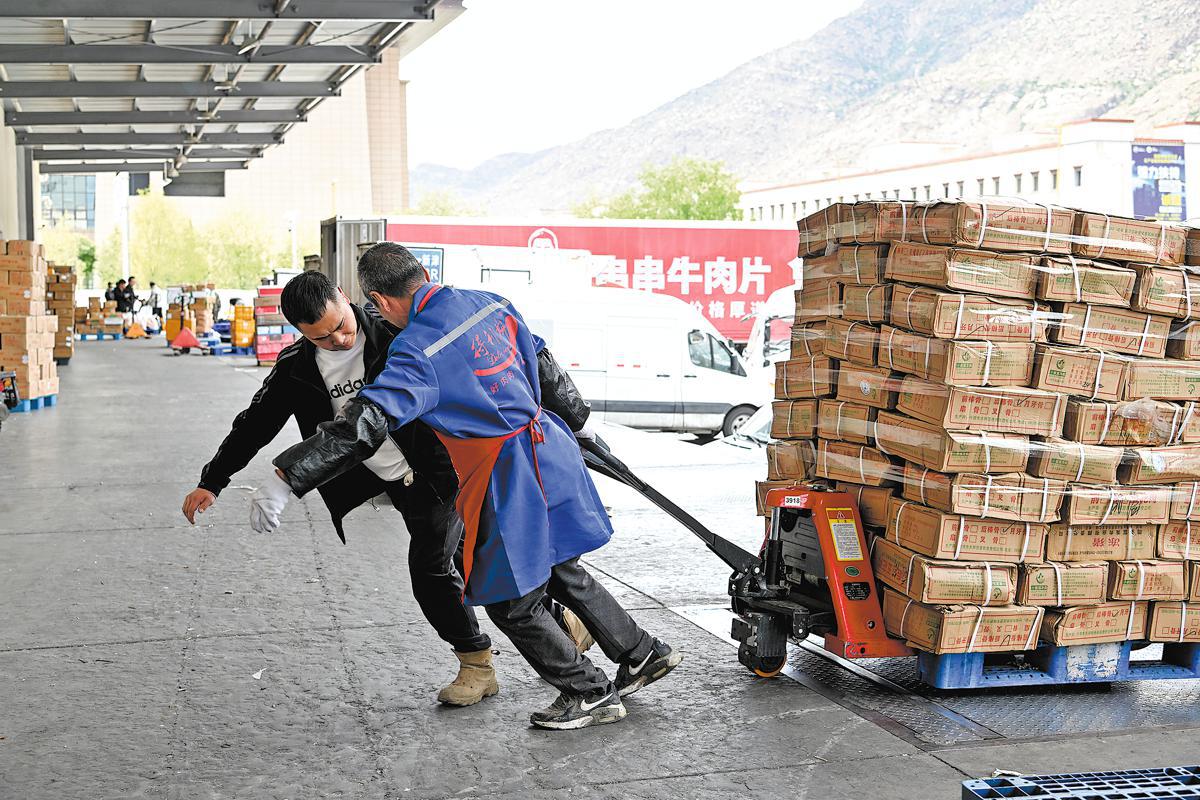Xizang delivery reform saves time and money


LHASA — When Ngawang Chophel ordered a down jacket online, he knew better than to expect it to arrive the next day. In his remote village in Southwest China's Xizang autonomous region, delayed deliveries are the norm, unlike the speedy service enjoyed by those who live in the country's more accessible regions.
Yet, the delivery system across Xizang today has improved significantly from the past, when parcels could take weeks to arrive in remote areas, with the last mileor more — usually done by the receiving party rather than the courier service.
"It used to take half a month for a parcel to reach us. It was both costly and time-consuming," said Ngawang Chophel, who hails from Pumaqangtang township in Nakarze county, Lhokha city of Xizang.
In the past, people from his village, located at an altitude of 5,373 meters, faced a two-day journey across the sparsely populated plateau to the county seat, which is more than 100 kilometers away, just to collect their mail and parcels. The gasoline bill for one such trip easily came to a hefty 100 yuan ($14).
Lhokha, covering a total area of 80,000 square kilometers, has a relatively small population of 354,000. For a long time, the eight market-based courier providers operating in the city only delivered packages to the county seat, and at best, to a few townships.
To improve the situation, Lhokha set out to overhaul its mail delivery system. It started by integrating the private courier services into the publicly funded postal network, so that the two systems worked better together.
By September 2024, the city had established a three-tier postal and courier system comprising 12 county-level digitalized hubs and 701 village or community-level service stations at both ends, with township-level posts functioning as bridges between.
To improve village-level logistics service hubs, the city allocated 10,000 yuan in subsidies to each station last year. In addition, it reinforced rural roads and attracted branded courier providers to operate in Lhokha.
Thanks to the reform, parcels are now delivered directly to residents' doorsteps in all 577 administrative villages across Lhokha. "Our township, Pumaqangtang, is the highest in China, and now we can receive delivery packages without any obstacles, which has greatly improved our lives," said Ngawang Chophel as he unpacked his down jacket, a package that reached him much faster than before.
More efficient deliveries are not limited only to making residents happy. "The 'last mile' of parcel delivery in and out of villages is crucial for enhancing consumption, promoting rural e-commerce, and supporting broader rural revitalization efforts," said Gyangkar, the vice-mayor of Lhokha.
China, the world's largest express delivery market, handled over 175 billion parcels in 2024, a 21.5 percent increase over the previous year. As China boasts a highly efficient courier sector, individual localities find it essential to keep up with the flow to stay economically competitive.
No longer bothered by the arduous commute required to pick up their packages, villagers in Lhokha are more inclined to shop online. Official statistics indicate that the total volume of online purchases in the city surpassed 1.45 billion yuan in 2024.
Local businesses have been integrated into the national production and supply chain thanks to the revamped express delivery system, noted an official in the city. For instance, the Xizang Hongnong agricultural development company, which operates the largest modern chicken farm in Xizang, previously had to suspend construction due to delayed packages. That's no longer the case.
Furthermore, local agricultural products now have an easier path to reach buyers in other parts of the country due to the reform. Tashi Lhamo, an influencer with four million followers, sells local specialty food ranging from Tibetan butter to tsampa through livestreaming.
She is pleased to see that the establishment of a logistics service station in her village in Chonggyai county has greatly supported her livestreaming business.
As of the end of last year, nearly 600,000 courier packages had been delivered to villagers' doorsteps as a result of the reform, benefiting over 230,000 farmers and herders. "This has made residents happier, and the flow of goods between urban and rural areas more efficient," Gyangkar said.
Xinhua
- Xizang delivery reform saves time and money
- Hotline eases nation's mental strain
- Nanjing curator turns brocade into a business
- Cotton yarn train services cut logistics costs in Xinjiang
- China raises level of emergency response to Typhoon Wipha in Guangdong, Hainan
- Mega-hydro project launched in Xizang





































